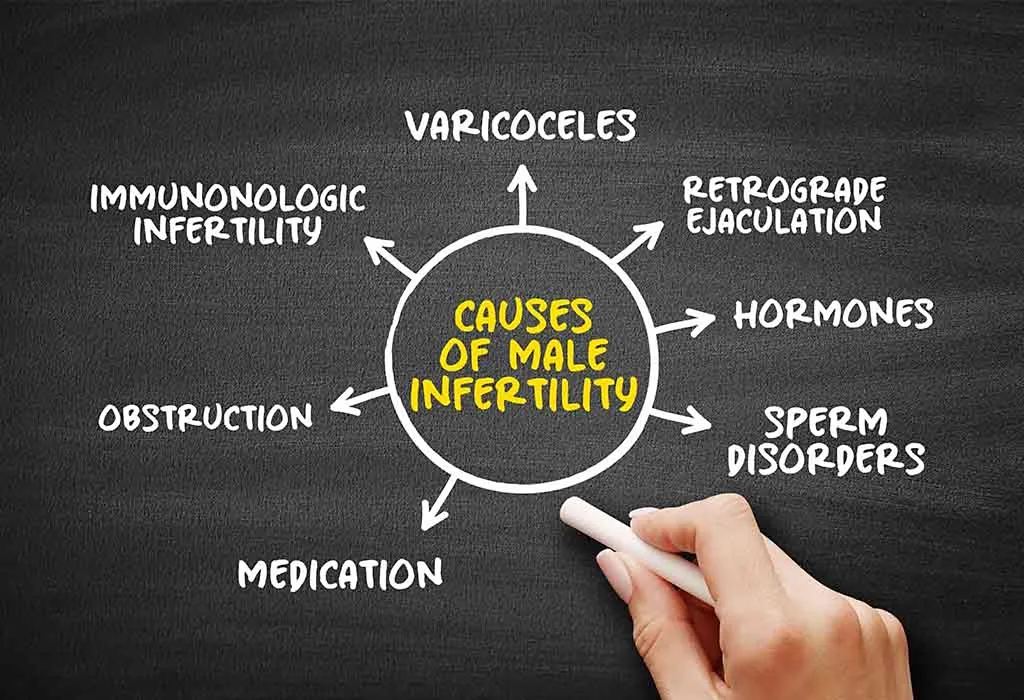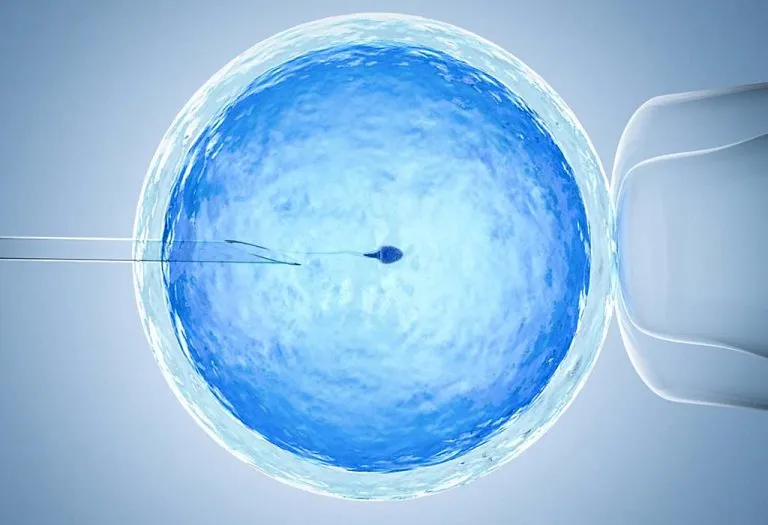Male Infertility: Causes, Symptoms, Tests & Treatment
It is estimated that 15% of all couples experience difficulties conceiving because of infertility. Unfortunately, women have been made to bear the brunt as they are held responsible, but that isn’t always the case. Male infertility is a topic that is largely avoided by men due to the social stigma attached and due to the patriarchal nature of our society. Often, the inability to conceive is due to problems with sperm production, ultimately relating to male infertility.
What Is Infertility in Men, and How Common Is It?
When men are unable to impregnate a woman for at least one year of unprotected intercourse, it is termed male infertility. This could be due to various reasons, from hormonal issues to lifestyle factors. Regarding infertile couples, it is thought that as many as 50% of the cases are because of male infertility.
Causes of Male Infertility
90% of all male potency problems are due to low sperm count, poor sperm quality or both. Age is also a factor that could lead to male infertility. Male partners at the age of 40 or older have a hard time impregnating their female partners. Below are some of the medical, environmental and other reasons for male infertility:
1. Medical Causes
- Varicocele: This is the enlargement of the veins within the scrotum and can cause a reduction in the sperm count.
- Tumours: Growth of tumours in the testicles can affect male fertility as it interferes with sperm production.
- Undescended Testicles: Descended testicles have a lower temperature than the body. Undescended testicles hinder sperm count as optimal production is only at a temperature slightly below the body.
2. Environmental Causes
- Radiation: Radiation can reduce the ability of the testes to produce sperm or damage the structure of the sperm. People undergoing cancer treatment may be subjected to radiation, resulting in infertility.
- Industrial Chemicals: Studies have shown that chemicals like lead reduce fertility in men. Men who live in communities close to factories may be subjected to irresponsible disposal of industrial waste and may be subjected to chemicals, such as lead and benzene. Other toxic chemicals, like fungicides, insecticides, and pesticides, are also known to hinder male fertility.
3. Health, Lifestyle and Other Causes
- Alcohol: Drinking more than 20 units of alcohol weekly can decrease the odds of a successful conception.
- Tobacco: A study conducted on Indian men showed that tobacco consumption decreased the quality of sperm and led to infertility.
- Stress: Studies have shown that unpleasant experiences can have a negative impact on the ability of testicles to produce sperm.
Symptoms
While there are no obvious physical signs of male infertility, the below-mentioned signs and symptoms may indicate it.
- Sexual dysfunction, like difficulty in getting an erection
- Swelling of testicles
- Reduced hair growth on the face or other parts of the body
- Reduced sexual activity
- Testicles that are small in size
- Testicles that are hard and lumpy
- Low sperm count
- Ejaculation has negligible semen
- Sperm that has a weird shape
- Poor quality of sperm
- Large twisted veins on the scrotum
- Dull pain in the testicles
- Inability to smell
- Less body or facial hair
Diagnosis and Tests
Fertility tests in men can be done by checking the blood for hormones, a physical exam or inspecting the semen. While semen analysis continues to be the primary method for assessing male infertility, there have been significant advancements in diagnostic tests to enhance the evaluation of sperm quality and function. These innovative tests have been introduced to enhance the accuracy of diagnoses and improve the overall management of male infertility.
- Blood Test: A blood test for male infertility examines the levels of follicle-stimulating hormones known as the Luteinising hormone. Low amounts of the hormone have been attributed to hypogonadism, whereas high amounts are known to cause abnormalities in sperm production. Both the
- Semen Leukocyte Analysis: This test checks for any white blood cells in the semen. Its presence indicates a genital infection that can affect fertility.
- Seminal Fructose Test: A negative test for this indicates that the individual has no sperm in their semen.
- Post-Ejaculate Urinalysis: This test studies the urine after ejaculation to see if the semen is flowing into the bladder instead of going through the urethra.
- Kruger Morphology: This test analyses the sperm structure to check for defects or abnormalities. An improper sperm structure has been attributed to poor fertility.
- Anti-Sperm Antibodies Test: This test is used to check if there are any antibodies present in the semen that kill the sperm. This sometimes happens when there is an injury in the testicles.
- Sperm Penetration Assay (SPA): This test is used to test the ability of the sperm to penetrate a woman’s egg.
- Ultrasound: This is used to examine the testes to see if there are any abnormalities that could cause infertility.
- Biopsy: A small tissue of the testicles is removed to check for cancerous cells. These cells hinder the ability of the testes to produce sperm.
- Vasography: It is an X-ray to detect any blockages that may lead to poor sperm production.
Possible Male Infertility Complications
Male infertility is not life-threatening but can cause significant emotional damage. What makes male infertility difficult is that the treatment can often cause minor issues. Below are some of the associated complications men are likely to experience:
- Emotional stress due to the inability to conceive
- Marital discord
- Feeling of hopelessness due to long treatment duration which prompts many men to discontinue treatment
- Financial stress due to expensive treatments such as Gonadotropin treatment
- Varicocele that has been left untreated for a long time cannot be corrected even with surgery
- Feeling a loss of masculinity that leads to depression
- Possible testicular damage while retrieving sperm for assisted reproductive techniques
- Ridicule by relatives and society can lead to a man becoming introverted
Treatment
Below are some of the methods on how to cure male infertility.
- Intracytoplasmic Sperm Injection: The sperm is directly into the egg for fertilisation.
- Regulated Sex Life: Reducing the number of times that copulation takes place can improve the sperm count and improve the chances of conception.
- Drug Therapy: Medicine for male fertility works at a hormonal level. For example, Clomid is given to activate the pituitary gland to produce sex hormones.
- Electro-Ejaculation Therapy: This is a way of acquiring sperm in men who have neurological impairments. Small electrical jolts are given to the prostate and seminal vesicles to kickstart ejaculation.
- Diet: Consuming the herbs and food items listed below can help improve male fertility.
Home Remedies to Improve Male Fertility
Going to a fertility clinic can be expensive and an unpleasant experience. Below are some natural medicines that can improve your fertility naturally.
- Ashwagandha: A natural Viagra, it can not only increase the libido in a person but also increase the sperm count by more than 160%
- Garlic: A natural treatment for male infertility, garlic helps reduce erectile dysfunctions and thus improves male potency.
- Green Tea: The presence of epigallocatechin gallate in green tea is known to have a positive effect on sperm quality.
- Ginko Leaves: Most erectile dysfunctions, which are a cause of male infertility, are because of cardiovascular issues. Ginko leaves have been known to increase blood flow and, as a result, improve male potency.
- Oysters: Apart from being a powerful aphrodisiac, they are packed with zinc, which helps in sperm production.
- Flaxseed Oil: One of the important ingredients for a male infertility diet is flaxseeds, which helps in prostrate health. It helps overall sperm upkeep with its rich reservoir of fatty acids and helps improve blood flow to the penis.
Other Medicines for Male Infertility
One of the main drugs for male infertility is Clomid. Though it is used by women, it can also be used by men. Male infertility supplements such as CountBoost and FertilAid are packed with vitamins and minerals that improve sperm health.
How to Manage Emotional Stress?
Learning about infertility can leave a man in shock. This is followed by anger, anxiety and a range of other emotions. Some of the methods to manage that emotional stress include:
- Consider treatment options. A discussion with the partner is crucial to narrow down what method works best for both
- Talking to a sexual therapist or counsellor can help reduce any tensions in the marriage/civil union
- Picking up a hobby can help channel the negative energy
- Talking to your spouse
Prevention
- Avoid tight-fitting underwear
- Avoid hot water showers
- Good personal hygiene
- Avoid excessive consumption of alcohol
- Increase your intake of zinc and folic acid
- Do yoga
- Stay fit, as obesity has been known to affect sperm quality
- Avoid multiple sexual partners prior to marriage, as STDs like genital warts can affect fertility
- A moderate amount of sex to improve the sperm count
- Cryopreservation for cancer treatment
When to Consult a Doctor?
While there are no outward signs that can detect male infertility, one can go to the doctor when
- There is a low sexual drive
- Inability to conceive a child even after trying for a year
- Pain in the testicles
- Prior surgery in the testicles may have reduced fertility, and treatment may be needed.
Male fertility can be challenging to deal with, but the success rates have been good, with more than 65%. Even in those situations where conventional methods don’t work, one can always opt for assisted reproductive methods or adoption.
References/Resources:
1. Leslie. S. W, Soon-Sutton. T. L, Khan. M. A. B; Male Infertility; NCBI; https://www.ncbi.nlm.nih.gov/books/NBK562258/; January 2023
2. Male infertility; Mayo Clinic; https://www.mayoclinic.org/diseases-conditions/male-infertility/symptoms-causes/syc-20374773
3. What is Male Infertility?; Urology Care Foundation; https://www.urologyhealth.org/urology-a-z/m/male-infertility
4. Male Infertility; Johns Hopkins Medicine; https://www.hopkinsmedicine.org/health/conditions-and-diseases/male-infertility
5. Male Infertility; Cleveland Clinic; https://my.clevelandclinic.org/health/diseases/17201-male-infertility
6. Infertility in men; Better Health Channel; https://www.betterhealth.vic.gov.au/health/conditionsandtreatments/infertility-in-men
7. Male Infertility; MedlinePlus; https://medlineplus.gov/maleinfertility.html
8. How common is male infertility, and what are its causes?; NIH; https://www.nichd.nih.gov/health/topics/menshealth/conditioninfo/infertility
9. Male Infertility; American Pregnancy Association; https://americanpregnancy.org/getting-pregnant/infertility/male-infertility/
10. Infertility; WHO; https://www.who.int/news-room/fact-sheets/detail/infertility
11. Male Infertility; Urologic Clinics of North America, 2020; https://www.sciencedirect.com/topics/medicine-and-dentistry/male-infertility
12. Agarwal. A, Baskaran. S, Parekh. N, et al.; Male infertility; The Lancet; https://www.thelancet.com/journals/lancet/article/PIIS0140-6736(20)32667-2/fulltext; January 2021
13. 10 reasons for male infertility; FIGO; https://www.figo.org/news/10-reasons-male-infertility
Also Read:
Male Fertility Tests
Azoospermia (No Sperm Count)
Male Fertility – Foods That Can Increase Sperm Count
Was This Article Helpful?
Parenting is a huge responsibility, for you as a caregiver, but also for us as a parenting content platform. We understand that and take our responsibility of creating credible content seriously. FirstCry Parenting articles are written and published only after extensive research using factually sound references to deliver quality content that is accurate, validated by experts, and completely reliable. To understand how we go about creating content that is credible, read our editorial policy here.




































